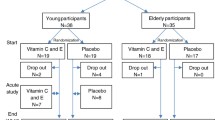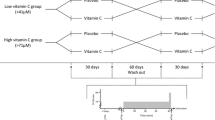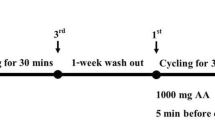Abstract
There is no consensus regarding the effects of mixed antioxidant vitamin C and/or vitamin E supplementation on oxidative stress responses to exercise and restoration of muscle function. Thirty-eight men were randomly assigned to receive either placebo group (n = 18) or mixed antioxidant (primarily vitamin C & E) supplements (n = 20) in a double-blind manner. After 6 weeks, participants performed 90 min of intermittent shuttle-running. Peak isometric torque of the knee flexors/extensors and range of motion at this joint were determined before and after exercise, with recovery of these variables tracked for up to 168 h post-exercise. Antioxidant supplementation elevated pre-exercise plasma vitamin C (93 ± 8 μmol l−1) and vitamin E (11 ± 3 μmol l−1) concentrations relative to baseline (P < 0.001) and the placebo group (P ≤ 0.02). Exercise reduced peak isometric torque (i.e. 9–19% relative to baseline; P ≤ 0.001), which persisted for the first 48 h of recovery with no difference between treatment groups. In contrast, changes in the urine concentration of F2-isoprostanes responded differently to each treatment (P = 0.04), with a tendency for higher concentrations after 48 h of recovery in the supplemented group (6.2 ± 6.1 vs. 3.7 ± 3.4 ng ml−1). Vitamin C & E supplementation also affected serum cortisol concentrations, with an attenuated increase from baseline to the peak values reached after 1 h of recovery compared with the placebo group (P = 0.02) and serum interleukin-6 concentrations were higher after 1 h of recovery in the antioxidant group (11.3 ± 3.4 pg ml−1) than the placebo group (6.2 ± 3.8 pg ml−1; P = 0.05). Combined vitamin C & E supplementation neither reduced markers of oxidative stress or inflammation nor did it facilitate recovery of muscle function after exercise-induced muscle damage.




Similar content being viewed by others
References
Alessio HM, Goldfarb AH, Cao G (1997) Exercise-induced oxidative stress before and after vitamin C supplementation. Int J Sport Nutr 7:1–9
Atkinson G (2002) Analysis of repeated measurements in physical therapy research: multiple comparisons amongst level means and multifactorial designs. Phys Ther Sport 3:191–203
Betts JA, Toone RJ, Stokes KA, Thompson D (2009) Systemic indices of skeletal muscle damage and recovery of muscle function after exercise: effect of combined carbohydrate-protein ingestion. Appl Physiol Nutr Metab 34:773–784
Bloomer RJ, Goldfarb AH, McKenzie MJ (2006) Oxidative stress response to aerobic exercise: comparison of antioxidant supplements. Med Sci Sports Exerc 38:1098–1105
Bloomer RJ, Falvo MJ, Schilling BK, Smith WA (2007) Prior exercise and antioxidant supplementation: effect on oxidative stress and muscle injury. J Int Soc Sports Nutr 4:9
Borg G (1973) Perceived exertion: a note on “history” and methods. Med Sci Sports 5:90–93
Brigelius-Flohe R (2009) Commentary: oxidative stress reconsidered. Genes Nutr 4:161–163
Brown SJ, Child RB, Donnelly AE, Saxton JM, Day SH (1996) Changes in human muscle contractile function following stimulated eccentric exercise. Eur J Appl Physiol 72:515–521
Calderwood SK, Mambula SS, Gray PJ Jr, Theriault JR (2007) Extracellular heat shock proteins in cell signaling. FEBS Lett 581:3689–3694
Cannon JG, Orencole SF, Fielding RA, Meydani M, Meydani SN, Fiatarone MA, Blumberg JB, Evans WJ (1990) Acute response in exercise: interaction of age and vitamin E on neutrophils and muscle enzyme release. Am J Physiol 259:R1214–R1219
Cannon JG, Meydani SN, Fielding RA, Fiatarone MA, Meydani M, Farhangmehr M, Orencole SF, Blumberg JB, Evans WJ (1991) Acute phase response in exercise II. Associations between vitamin E, cytokines, and muscle proteolysis. Am J Physiol 260:R1235–R1240
Carr A, Frei B (1999) Does vitamin C act as a pro-oxidant under physiological conditions? FASEB J 13:1007–1024
Clarkson PM, Hubal MJ (2002) Exercise-induced muscle damage in humans. Am J Phys Med Rehabil 81:S52–S69
Costill DL, Pascoe DD, Fink WJ, Robergs RA, Barr SI, Pearson DR (1990) Impaired muscle glycogen resynthesis after eccentric exercise. J Appl Physiol 69:46–50
Dawson B, Henry GJ, Goodman C, Gillam I, Beilby JR, Ching S, Fabian V, Dasig D, Morling P, Kakulus BA (2002) Effect of Vitamin C and E supplementation on biochemical and ultrastructural indices of muscle damage after a 21 km run. Int J Sports Med 23:10–15
Dekkers JC, van Doornen LJP, Kemper HCG (1996) The role of antioxidant vitamins and enzymes in the prevention of exercise-induced muscle damage. Sports Med 21:213–238
Dill DB, Costill DL (1974) Calculation of percentage changes in volumes of blood, plasma and red cells in rehydration. J Appl Physiol 37:247–248
Fischer CP, Hiscock NJ, Penkowa M, Basu S, Vessby B, Kallner A, Sjoberg LB, Pedersen BK (2004) Supplementation with vitamins C and E inhibits the release of interleukin-6 from contracting human skeletal muscle. J Physiol (Lond) 558:633–645
Friden J, Lieber RL (1992) Structural and mechanical basis of exercise-induced muscle injury. Med Sci Sports Exerc 24:521–530
Gleeson M, Robertson JD, Maughan RJ (1987) Influence of exercise on ascorbic acid status in man. Clin Sci (Lond) 73:501–505
Goldfarb AH (1993) Antioxidants: role of supplementation to prevent exercise-induced oxidative stress. Med Sci Sports Exerc 25:232–236
Goldfarb AH, Bloomer RJ, McKenzie MJ (2005) Combined antioxidant treatment effects on blood oxidative stress after eccentric exercise. Med Sci Sports Exerc 37:234–239
Gomez-Cabrera MC, Domenech E, Romagnoli M, Arduini A, Borras C, Pallardo FV, Sastre J, Vina J (2008) Oral administration of vitamin C decreases muscle mitochondrial biogenesis and hampers training-induced adaptations in endurance performance. Am J Clin Nutr 87:142–149
Halliwell B, Chirico S (1993) Lipid peroxidation: its mechanism, measurement, and significance. Am J Clin Nutr 57:715S–724S
Hathcock JN, Azzi A, Blumberg J, Bray T, Dickinson A, Frei B, Jialal I, Johnston CS, Kelly FJ, Kraemer K, Packer L, Parthasarathy S, Sies H, Traber MG (2005) Vitamins E and C are safe across a broad range of intakes. Am J Clin Nutr 81:736–745
Herbert V (1994) The antioxidant supplement myth. Am J Clin Nutr 60:157–158
Hess D, Keller HE, Oberlin B, Bonfanti R, Schuep W (1991) Simultaneous determination of retinol, tocopherols, carotenes and lycopene in plasma by means of high-performance liquid chromatography on reversed phase. Int J Vitam Nutr Res 61:232–238
Hopkins WG, Marshall SW, Batterham AM, Hanin J (2009) Progressive statistics for studies in sports medicine and exercise science. Med Sci Sports Exerc 41:3–13
Howatson G, van Someren KA (2008) The prevention and treatment of exercise-induced muscle damage. Sports Med 38:483–503
Howatson G, McHugh MP, Hill JA, Brouner J, Jewell AP, van Someren KA, Shave RE, Howatson SA (2009) Influence of tart cherry juice on indices of recovery following marathon running. Scand J Med Sci Sports. doi:10.1111/j.1600-0838.2009.01005.x
Jakeman P, Maxwell S (1993) Effect of antioxidant vitamin supplementation on muscle function after eccentric exercise. Eur J Appl Physiol 67:426–430
Kanter MM, Nolte LA, Holloszy JO (1993) Effects of an antioxidant vitamin mixture on lipid peroxidation at rest and post exercise. J Appl Physiol 74:965–969
Khassaf M, McArdle A, Esanu C, Vasilaki A, McArdle F, Griffiths RD, Brodie DA, Jackson MJ (2003) Effect of vitamin C supplements on antioxidant defence and stress proteins in human lymphocytes and skeletal muscle. J Physiol (Lond) 549:645–652
Kirwan JP, Hickner RC, Yarasheski KE, kohrt WM, Wiethop BV, Holloszy JO (1992) Eccentric exercise induces transient insulin resistance in healthy individuals. J Appl Physiol 72:2197–2202
Komulainen J, Takala TE, Vihko V (1995) Does increased serum creatine kinase activity reflect exercise-induced muscle damage in rats? Int J Sports Med 16:150–154
Liu W, Morrow JD, Yin H (2009) Quantification of F2-isoprostanes as a reliable index of oxidative stress in vivo using gas chromatography-mass spectrometry (GC-MS) method. Free Radic Biol Med 47:1101–1107
Machefer G, Groussard C, Vincent S, Zouhal H, Faure H, Cillard J, Radak Z, Gratas-Delamarche A (2007) Multivitamin-mineral supplementation prevents lipid peroxidation during “the Marathon des Sables”. J Am Coll Nutr 26:111–120
Margaritis I, Tessier F, Verdera F, Bermon S, Marconnet P (1999) Muscle enzyme release does not predict muscle function impairment after triathlon. J Sports Med Phys Fitness 39:133–139
Mastaloudis A, Morrow JD, Hopkins DW, Devaraj S, Traber MG (2004) Antioxidant supplementation prevents exercise-induced lipid peroxidation, but not inflammation, in ultramarathon runners. Free Radic Biol Med 36:1329–1341
Mastaloudis A, Traber MG, Carstensen K, Widrick JJ (2006) Antioxidants did not prevent muscle damage in response to an ultramarathon run. Med Sci Sports Exerc 38:72–80
Matthews JN, Altman DG, Campbell MJ, Royston P (1990) Analysis of serial measurements in medical research. Br Med J 300:230–235
Meydani M, Evans WJ, Handelman G, Biddle L, Fielding RA, Meydani SN, Burrill J, Fiatarone MA, Blumberg JB, Cannon JG (1993) Protective effect of vitamin E on exercise-induced oxidative damage in young and older adults. Am J Physiol 264:R992–R998
Morton JP, Croft L, Bartlett JD, Maclaren DP, Reilly T, Evans L, McArdle A, Drust B (2009) Reduced carbohydrate availability does not modulate training-induced heat shock protein adaptations but does upregulate oxidative enzyme activity in human skeletal muscle. J Appl Physiol 106:1513–1521
Ng AV, Agre JC, Hanson P, Harrington MS, Nagle FJ (1994) Influence of muscle length and force on endurance and pressor responses to isometric exercise. J Appl Physiol 76:2561–2569
Nicholas CW, Nuttall FE, Williams C (2000) The Loughborough intermittent shuttle test: a field test that simulates the activity pattern of soccer. J Sports Sci 18:97–104
Onishi H, Yagi R, Oyama M, Akasaka K, Ihashi K, Handa Y (2002) EMG-angle relationship of the hamstring muscles during maximum knee flexion. J Electromyogr Kinesiol 12:399–406
Packer L (1992) Interactions among antioxidants in health and disease: vitamin E and its redox cycle. Proc Soc Exp Biol Med 200:271–276
Peake JM, Suzuki K, Hordern M, Wilson G, Nosaka K, Coombes JS (2005) Plasma cytokine changes in relation to exercise intensity and muscle damage. Eur J Appl Physiol 95:514–521
Peters EM, Anderson R, Nieman DC, Fickl H, Jogessar V (2001) Vitamin C supplementation attenuates the increases in circulating cortisol, adrenaline and anti-inflammatory polypeptides following ultramarathon running. Int J Sports Med 22:537–543
Petersen EW, Ostrowski K, Ibfelt T, Richelle M, Offord E, Halkjaer-Kristensen J, Pedersen BK (2001) Effect of vitamin supplementation on cytokine response and on muscle damage after strenuous exercise. Am J Physiol 280:C1570–C1575
Powers SK, Smuder AJ, Kavazis AN, Hudson MB (2010) Experimental guidelines for studies designed to investigate the impact of antioxidant supplementation on exercise performance. Int J Sport Nutr Exerc Met 20:2–14
Pyne DB (1994) Exercise-induced muscle damage and inflammation: a review. Aust J Sci Med Sport 26:49–58
Rokitzki L, Logemann E, Sagredos AN, Murphy M, Wetzel-Roth W, Keul J (1994) Lipid peroxidation and antioxidative vitamins under extreme endurance stress. Acta Physiol Scand 151:149–158
Schroder H, Navarro E, Tramullas A, Mora J, Galiano D (2000) Nutrition antioxidant status and oxidative stress in professional basketball players: effects of a three compound antioxidative supplement. Int J Sports Med 21:146–150
Smith LL (1991) Acute inflammation: the underlying mechanism in delayed onset muscle soreness? Med Sci Sports Exerc 23:542–551
Suzuki K, Peake J, Nosaka K, Okutsu M, Abbiss CR, Surriano R, Bishop D, Quod MJ, Lee H, Martin DT, Laursen PB (2006) Changes in markers of muscle damage, inflammation and HSP70 after an Ironman Triathlon race. Eur J Appl Physiol 98:525–534
Teixeira VH, Valente HF, Casal SI, Marques AF, Moreira PA (2009) Antioxidants do not prevent postexercise peroxidation and may delay muscle recovery. Med Sci Sports Exerc 41:1752–1760
Thompson D, Nicholas CW, Williams C (1999) Muscular soreness following prolonged intermittent high-intensity shuttle running. J Sports Sci 17:387–395
Thompson D, Williams C, McGregor SJ, Nicholas CW, McArdle F, Jackson MJ, Powell JR (2001) Prolonged vitamin C supplementation and recovery from demanding exercise. Int J Sport Nutr Exerc Met 11:466–481
Thompson D, Bailey DM, Hill J, Hurst T, Powell JR, Williams C (2004) Prolonged vitamin C supplementation and recovery from eccentric exercise. Eur J Appl Physiol 92:133–138
Warren JA, Jenkins RR, Packer L, Witt EH, Armstrong RB (1992) Elevated muscle vitamin E does not attenuate eccentric exercise-induced muscle injury. J Appl Physiol 72:2168–2175
Yfanti C, Akerstrom T, Nielsen S, Nielsen AR, Mounier R, Mortensen OH, Lykkesfeldt J, Rose AJ, Fischer CP, Pedersen BK (2010) Antioxidant supplementation does not alter endurance training adaptation. Med Sci Sports Exerc 42:1388–1395
Acknowledgments
This study received financial support from Unilever R&D. The authors thank Ruth Carr, Faye Hext and Simon Jones for their assistance with data collection and Duncan Talbot for assistance with sample analysis.
Conflict of interest
Dr Hurst is employed by Unilever.
Author information
Authors and Affiliations
Corresponding author
Additional information
Communicated by William Kraemer.
Electronic supplementary material
Below is the link to the electronic supplementary material.
Rights and permissions
About this article
Cite this article
Bailey, D.M., Williams, C., Betts, J.A. et al. Oxidative stress, inflammation and recovery of muscle function after damaging exercise: effect of 6-week mixed antioxidant supplementation. Eur J Appl Physiol 111, 925–936 (2011). https://doi.org/10.1007/s00421-010-1718-x
Accepted:
Published:
Issue Date:
DOI: https://doi.org/10.1007/s00421-010-1718-x




